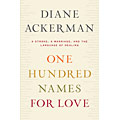Staying Fit


“My Little Spice Owl,” he would call her. Or “Mistress of Wonderment.” Or “She for Whom All Flowers Bloom Early.” Recovering from the massive stroke he suffered in 2005, poet and novelist Paul West dreamed up these and dozens of other fanciful names for his wife, writer Diane Ackerman.
The endearments suggest how much he adored her. More than that, they demonstrate the extent to which West was able to regain his mastery of English, though the stroke had ravaged the key language areas of his brain.


AARP Membership— $12 for your first year when you sign up for Automatic Renewal
Get instant access to members-only products and hundreds of discounts, a free second membership, and a subscription to AARP the Magazine.
Ackerman chronicles her husband’s epic struggle in her wise and luminous new book, One Hundred Names for Love: A Stroke, A Marriage, and the Language of Healing. Make that she chronicles their epic struggle.
A “word-besotted” couple, Ackerman and West met in the early 1970s at Penn State University, where she was a “flower-child undergraduate” and he a professor of literature 18 years her senior, with “yards of education … and a classy English accent.” Ackerman is at her most lyrical in One Hundred Names for Love when describing West’s gift for language: “Paul had a draper’s touch for the unfolding fabric of a sentence,” she writes early on, “and he collected words like rare buttons.”
Though Ackerman — an award-winning poet and naturalist — is best known as the author of A Natural History of the Senses (1990), she had also delved into the brain’s “marvel and mystery” for her 2004 book, An Alchemy of Mind. In One Hundred Names for Love she deftly explains how the brain compensates for physical insults and injuries, adapting and growing and forging new pathways.
Still, her husband’s journey was harrowing. And his recovery — though its scope defied the odds and baffled medical experts — will never be complete.

































































More From AARP
Interview With Michio Kaku, Author of 'Physics of the Future'
The physicist discusses his vision of the next 100 years.